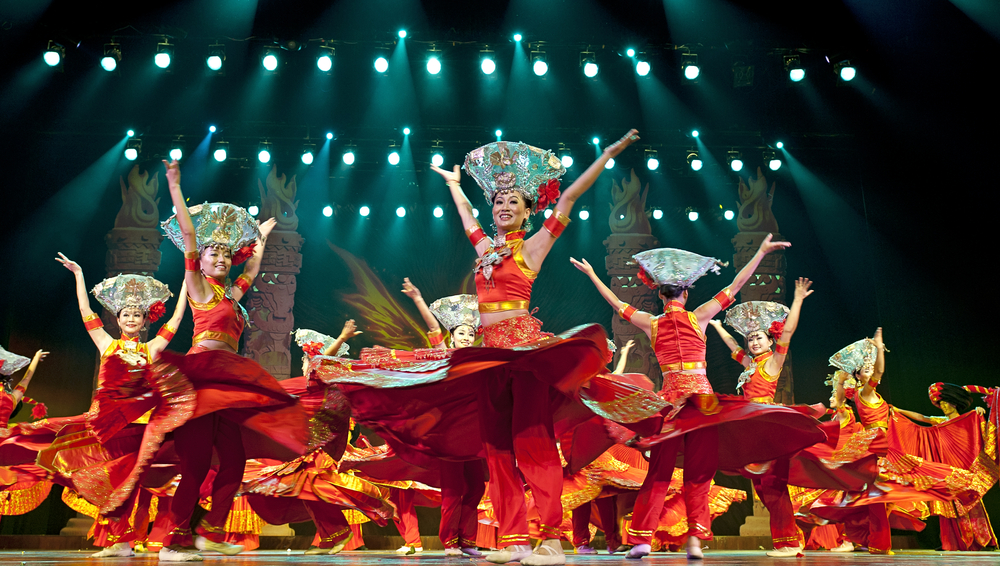
Captivated by their scintillating Internet marketing, I went to see Shen Yun, now branded “China before Communism”. Shen Yun is the theatrical enterprise of Falun Gong, apparently a rather profitable venture. Falun Gong is a controversial religious movement that is ostracized in mainland China and Shen Yun is controversial, too: see, for example, the New Yorker here.
I wasn’t particularly excited. The show is divided into many, shorter bits. Some are rather interesting: I was enchanted by an Erhu soloist and found the singers pretty good. I thought the orchestra was excellent, and Shen Yun seems clearly capable of attracting great talent. They attracted great interest too; the theatre was packed, for a matinee in a mid-size Italian city, and most of the audience members were Italians, rather than Chinese expatriates. In the songs, a couple of verses were explicitly anti-evolution and anti-atheism, without much of an argument more than, “these things are bad for you.” Still, I don’t think many noticed at all.
I was more puzzled by the rather naïve and cartoonish, dancing presentation of dramatic events such as protest repression and “organ harvesting”. I wish I could ask somebody from China if that kind of representation, which is necessarily euphemistic as it goes through dancing in beautiful costumes, resonates with her. To the Western eye, it doesn’t: it trivializes something very serious.
However, the big criticism of Falun Gong is that this show is propaganda wrapped up in theater. I think that’s unfair. If this is propaganda, it is of the obvious, hence harmless, kind. The denunciation of communism is clear, but it is not overwhelming (it doesn’t touch any economic arguments, for example) and it can be ignored by the audience. In fact, I think most of the audience, in the case of the representation I attended, didn’t pay much attention and wasn’t nudged to. Plus, I can hardly see why this kind of “propaganda” should be a problem, in a world in which we are deafened by politically correct propaganda of the opposite time: which is not more subtle, but only more pressing. While my sympathies do not lie with the religious values of Falun Gong, I am appalled that such a show can be considered a “problem” by anybody.
A last, bittersweet comment. Falun Gong could have gone for more religious preaching, or more political pamphleteering. Instead, they created a music show and achieved tremendous success. They understood something most of us libertarians don’t: that people respond to stories, not to arguments. Perhaps some creative minds in our movement should create a show, “America before socialism”, and tour the world and compete with Shen Yun. I bet it wouldn’t be the worst strategic move in the history of libertarianism.

READER COMMENTS
Hana
Apr 11 2023 at 7:08pm
I have seen and enjoyed it.
The simpler message I received was that it is the CCP, not China, that is the issue. Given there are millions of adherents to Falun Gong in China, who are at risk of torture and imprisonment for their faith, a slow building of western support is likely to be more effective than an aggressive, in the CCPs face approach.
Sincere advocates of peace are always more constrained than there more warlike brothers and sisters.
AMW
Apr 12 2023 at 6:31am
I saw it a few years back and did not enjoy it much. I felt that the advertising vs. the content constituted a real bait-and-switch. But I wouldn’t say there is anything problematic about the show per se. They should just be more honest up front that it is a two hour commercial for Falun Gong (which, incidentally, seems to be something approximating Chinese Mormonism).
nobody.really
Apr 12 2023 at 11:17am
Upton Sinclair
William Hummel and Keith Huntress, “What is Propaganda?” (1949), in Think Before You Write 402, 404 (William G. Leary & James Steel Smith eds., 1951).
Pablo Picasso, “Picasso Speaks,” in The Arts, vol. 3, at 315 (1923)
Vladimir Nabokov, Strong Opinions, at 32 (1973)
Oscar Wilde
Scott Alexander, “Who by Very Slow Decay”
Oscar Wilde, The Importance of Being Earnest, Act 1
(Since Mingardi is in Italy, perhaps he can wander by the Palazzo di Propaganda Fide in Rome—the original propagandists!)
nobody.really
Apr 12 2023 at 12:43pm
If I recall correctly, both Uncle Tom’s Cabin and Huckleberry Finn were written to provoke public outrage against the institution of slavery. The Hunchback of Notre Dame de Paris was written to trigger preservation of historic buildings. In The Battle for Christmas (1996), Stephen Nissenbaum argues that “A Visit from St. Nicolas (T’was the Night Before Christmas)” was written as part of campaign to turn Christmas—which in the 1820s was celebrated as a rowdy combination of Mardi Gras/Halloween/New Years Eve—into a domestic holiday of family, childhood innocence, and consumerism. Laura Ingalls Wilder’s Little House on the Prairie books were edited by her libertarian daughter to present a romanticized version of rugged individualism that contrasted with Wilder’s actual life circumstances. And I don’t suppose people on this blog need to be reminded of the works of Ayn Rand.
Art and propaganda: Partners forever.
nobody.really
Apr 12 2023 at 11:27am
I think it’s called “Up With People.”
Comments are closed.